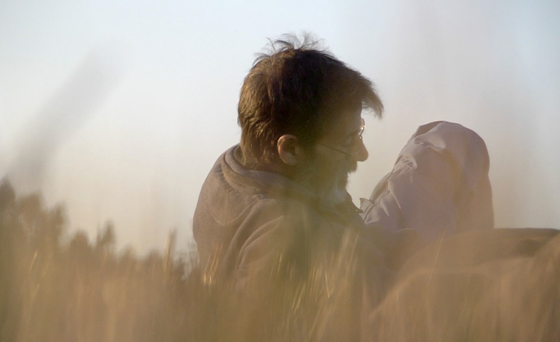Reviews include Irena’s Vow, The Beast, and Before I Change My Mind.
MDFF Presents: Programming the Unprogrammed
July 2, 2015
by Adam Nayman
Last week, Medium Density Fibreboard Film co-founders Dan Montgomery and Kazik Radwanski (Tower) announced that they’d brought on a pair of programmers to help curate their monthly screening series in Toronto: Kiva Reardon, the founding editor of cléo, and Blake Williams, an experimental filmmaker and contributor to Cinema Scope. Over the past few years, the MDFF series has played host to some of the best American independent films otherwise undistributed in the city, including Joel Potrykus’ Ape and Whitney Horn and Kalman Young’s L For Leisure; last month, they hosted a showing of the extraordinary Portuguese documentary What Now? Remind Me by Joaquim Pinto at the Royal Cinema. While these films are mostly being shown on Blu-Ray and on modestly-sized screens – past locations have included Double Double Land and Camera Bar – they’ve attracted a loyal, appreciative, and notably youthful audience. I emailed Kazik, Blake and Kiva to talk about expanding the programming team, targeting Toronto’s cinephile community, and what films they’d most like to bring in in the future.

What’s the significance of a screening series designed to be small expanding its programming team? Is there a possibility that a bigger programming team is a means to bringing in a wider audience?
Kazik: No, or at least I hope not. There’s always the natural desire for wanting things to grow. However, I feel that I we were to start choosing films based on how many seats we think we could fill we would lose something. I think our series has a lot of power because we can program whatever we want. If there is an important film that needs to play in Toronto and for whatever reason isn’t, we can make that happen.
Blake: I think part of Kaz’s impulse to add to the team was to incorporate some different yet related perspectives to the series’ overall vision. Kiva founded cléo and I make and write about experimental work, so it’s a way of bringing new angles into the programming dynamic, which ideally will mean we reach a larger audience. And since Kiva and I are both writers, there will be short essays for all of the films we screen, which will be posted on our website and help contextualize the films we’re showing, make them more accessible, and let people know why they ought to drop whatever they’re doing and come see these them.
Is there a lack of distribution and exhibition for smaller American and foreign films in Toronto? Is the idea to show things that are being ignored elsewhere?
Kazik: I suppose the spark that led to us starting the series was through the distribution of my own film Tower. My gut feeling was, “if a film like ours was made in another city, could it screen in Toronto?” For us to feel good about the film culture we live and work in, this needs to be able to happen. There has to be more chaos and ways for films like Ape or The Emperor Visits The Hell to screen here. Artists need to be able to create works independently and have them screened and written about based on their merit alone. For the ecosystem to be healthy, there has to be more algae in the pond and more wildflowers in the garden.
“For the ecosystem to be healthy, there has to be more algae in the pond and more wildflowers in the garden.”
Kiva: We are looking to create a programme that’s aware of the lack of diversity in the film industry and try and remedy it. I think that’s an important part of the programming conversation that doesn’t get acknowledged enough. Hollywood is very white and male, and that can also be the case in independent film circles, for similar reasons to mainstream movie-making: access, connections and the taste-makers not reaching outside of the areas of expertise.

Have there been any screening series or events in Toronto that you’ve been inspired by? Or, conversely, that you’re trying to contrast or contradict?
Blake: I think the only thing we’re trying to contradict is whatever forces there are that prevent these films from playing in Hot Docs, TIFF, etc. and getting released in Toronto theatres. There are a number of regular independent screening series here—namely, Early Monthly Segments, Regional Support Network, and Pleasure Dome—that consistently do awesome work, and Colin Geddes and co. at The Royal, who’ve recently brought us limited runs of films like Hard to Be a God and Welcome to New York, are certainly working in a similar spirit to us, and could be considered models or sources of inspiration.
How would you describe your audience? How would you describe the audience that you want to add on top of the regulars?
Kazik: Our audience is young. Which is exciting. It’s great to see so many young people interested in unconventional and demanding films. What’s nice is that there is quite often a crossover with the fine arts or photography community that brings people to our screenings with less of a film background. What we really want to do is gain the trust of the larger cinephile audience. We want the people who were at those sold out Bresson retrospective screenings to give us a chance. I just feel like it will take time.
“The point is for the film to play in Toronto, regardless of who ultimately makes that happen.”
Are there films that you would be hesitant to bring in because it might affect their chances of official distribution down the road?
Blake: We’re in close contact with the filmmakers, and if they or we feel there is any chance their film might still have a run in Toronto in the future, we’ll hold off. As a general rule (with some exceptions), we won’t seriously consider showing a film until at least a year after its world premiere, i.e. after it’s been passed up by Toronto’s hundreds of film festivals, and is still without a Canadian distributor. Since I joined MDFF Presents two months ago, there have already been some films that were on our radar that got a Toronto run announced out of the blue, or were announced for a smaller local film festival (e.g., A Midsummer’s Fantasia, which was announced as part of the Toronto Korean Film Festival about a minute before I was going to contact Jang Kun-jae to see if we could show it in the Fall), and really I couldn’t be happier when this happens. The point is for the film to play in Toronto, regardless of who ultimately makes that happen.
What are the chances that this series would expand to older films?
Kazik: There’s a chance. However, I don’t think that’s our immediate focus. We’ve got our hands pretty full at the moment with contemporary cinema. It’s not out of the question. Perhaps we could co-present a particularly relevant restoration.
Ok, what’s one film that you’d like to bring in thats never shown in Toronto?
Kazik: I remember once reading about an Alan Clarke retrospective in the 90s. I don’t know if that ever made it up here but it just sounded incredible.
Blake: I’d love to bring David Gatten here to show The Extraordinary Shadows! Also any number of recent digital work by James Benning and 3D experiments by Ken Jacobs.



